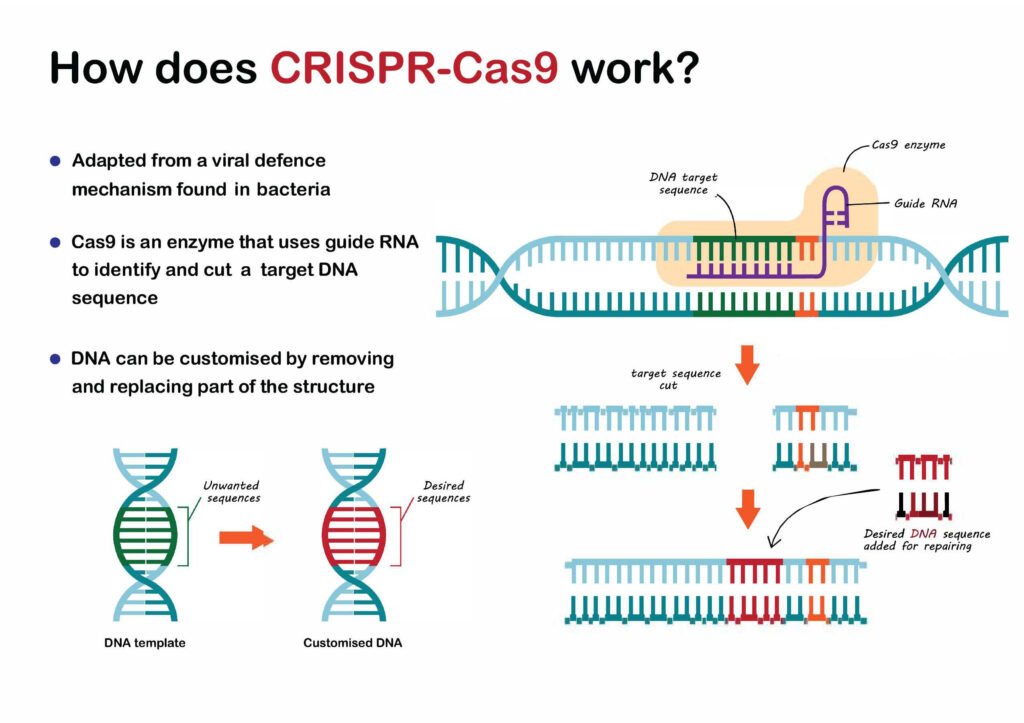
As we delve into the remarkable capabilities of CRISPR-Cas9, we explore whether humanity is approaching god-like control over life itself, considering the profound scientific, ethical, and societal implications.
Introduction
The advent of CRISPR-Cas9 technology has revolutionized the field of genetic engineering, bringing us closer than ever to mastering the genetic code of life. This powerful tool, which allows for precise editing of DNA, has opened up possibilities that were once the realm of science fiction. From curing genetic diseases to enhancing human abilities, CRISPR-Cas9 raises the question: Are humans becoming gods?

Understanding CRISPR-Cas9
CRISPR-Cas9 stands for Clustered Regularly Interspaced Short Palindromic Repeats and CRISPR-associated protein 9. This system, derived from a natural defense mechanism found in bacteria, enables scientists to make targeted modifications to the DNA of living organisms. The Cas9 protein acts like molecular scissors, cutting the DNA at a specific location, while a guide RNA directs the Cas9 to the exact spot in the genome that needs to be edited.
Since its discovery in 2012, CRISPR-Cas9 has rapidly become the preferred method for gene editing due to its simplicity, efficiency, and affordability. Researchers worldwide are utilizing this technology to study genes and develop treatments for a wide range of diseases.
Medical Applications
One of the most promising applications of CRISPR-Cas9 is in the field of medicine. Scientists are exploring its potential to cure genetic disorders such as cystic fibrosis, sickle cell anemia, and Huntington’s disease. By correcting the faulty genes responsible for these conditions, CRISPR-Cas9 offers hope for treatments that address the root cause rather than just managing symptoms.
In 2019, a groundbreaking study demonstrated the successful use of CRISPR-Cas9 to treat sickle cell anemia in a patient. This marked a significant milestone, proving that gene editing could be used safely and effectively in humans. Similar efforts are underway to develop CRISPR-based therapies for various other genetic diseases.
Beyond Disease: Human Enhancement
The potential of CRISPR-Cas9 extends beyond treating diseases. It opens the door to human enhancement, where genetic modifications could improve physical and cognitive abilities. This includes increasing muscle strength, enhancing memory, and even extending lifespan. While these possibilities are tantalizing, they also raise ethical concerns about the implications of creating “designer humans.”
Agricultural and Environmental Impact
CRISPR-Cas9 is also being applied in agriculture to develop crops that are more resistant to pests, diseases, and environmental stresses. This could lead to higher yields and reduced reliance on chemical pesticides, benefiting both farmers and the environment. Additionally, scientists are exploring the use of CRISPR to modify livestock for improved health and productivity.
In the environmental sphere, CRISPR-Cas9 could be used to combat invasive species and restore endangered populations. For example, researchers are working on using CRISPR to eradicate mosquitoes that transmit diseases like malaria and dengue fever.
Ethical and Societal Implications
While the potential benefits of CRISPR-Cas9 are immense, the technology also raises significant ethical and societal questions. The ability to edit human embryos, for instance, has sparked a global debate about the morality of altering the human germline. This could lead to unintended consequences that affect future generations, making the stakes incredibly high.
One of the most controversial applications of CRISPR-Cas9 was the case of Chinese scientist He Jiankui, who claimed to have created the world’s first genetically edited babies in 2018. His announcement was met with widespread condemnation from the scientific community, highlighting the need for stringent ethical guidelines and regulatory oversight.
Future Prospects
The future of CRISPR-Cas9 is both exciting and uncertain. As the technology continues to advance, its applications are likely to expand in ways we cannot yet fully predict. Researchers are already working on next-generation CRISPR systems that offer even greater precision and fewer off-target effects.
One of the key challenges moving forward will be ensuring equitable access to CRISPR-based therapies. There is a risk that such treatments could exacerbate existing social inequalities if they are only available to the wealthy. Ensuring that the benefits of gene editing are shared widely will be crucial for its ethical implementation.

Conclusion
CRISPR-Cas9 represents a monumental leap in our ability to understand and manipulate the genetic code. Its potential to cure diseases, enhance human abilities, and address global challenges is profound. However, with great power comes great responsibility. As we stand on the brink of becoming gods in our own right, it is imperative that we proceed with caution, guided by rigorous ethical standards and a commitment to the greater good. The journey of CRISPR-Cas9 is just beginning, and its impact on the future of humanity will be one of the defining stories of our time.
For more detailed information, you can read the comprehensive coverage on Gulf News.
















